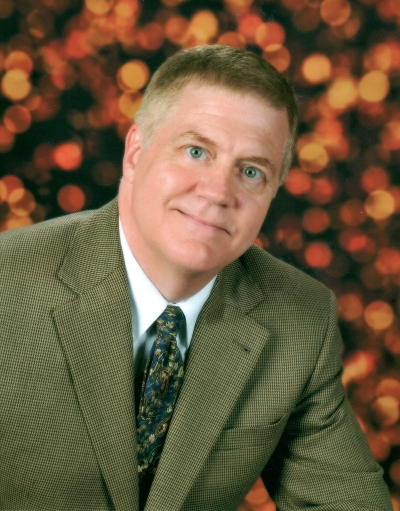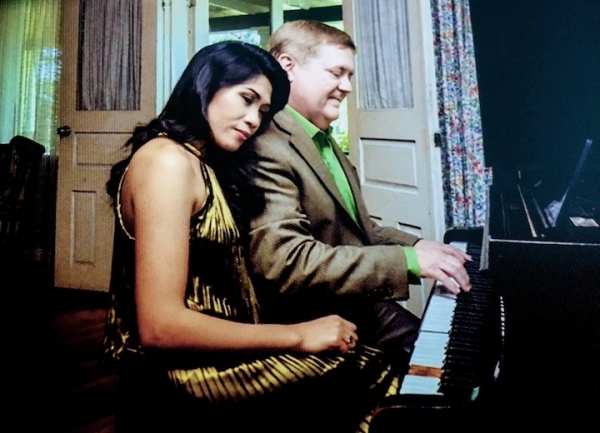Who do you think the composer is who is second only to JS Bach in the number of solo piano pieces on SheetMusicPlus.com? Beethoven? Mozart? Chopin? George Winston? David Lanz? Nope! It’s James Michael Stevens with an incredible 2429 piano solos available there (with lots more to come!)! (Bach has 2912 and Beethoven has 2402. The only other contemporary composer in the Top 20 is Don Hodell Chilcote with 548!) He’s also in the Top 5 composers for solo violin (496) and #1 for solo oboe (256)! I’ve reviewed some of his piano albums and sheet music, so this seemed like a good time to get to know James better. It turns out he’s an amazing person! Enjoy!
KP: Hi, James! How are you today?
JMS: Hi, Kathy! I’m doing great.
KP: You released your latest solo piano album and songbook, Autumn Moods, last week, which I really enjoyed reviewing. How many piano albums, singles and songbooks have you released to date?
JMS: Thanks, Kathy! I appreciate your great review of Autumn Moods and autumn is by far my favorite time of year. I think I have around 20 piano albums and over 400 songs on Spotify, Pandora, etc… and many more not released yet. As far as books, I have over 50 piano books.
KP: Wow! That’s impressive! You mentioned to me awhile back that you have more music in sheet music form for sale on SheetMusicPlus.com than Beethoven. Is that still true?
JMS: In the area of piano solo compositions, I now have more than Beethoven and am only behind Bach. I thought I was going to pass them all and was ahead of Bach, but some publishers uploaded more than 400 editions of Bach pieces in the last year.
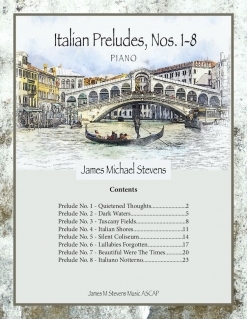
Click on covers to go
to Kathy's reviews.
KP: About how many titles do you have there?
JMS: In total, I have over 4,400 publications at Sheet Music Plus. However, I also have many publications with other publishers as well and with several film score companies such as SongTradr, Imaginary Friends Music Group, and ScoreKeepers.
KP: I know that you write other kinds of music in addition to solo piano. What do those include?
JMS: Originally, my publications over the years were centered around choral music for the church and school market with many different mainstream publishers including: Shawnee Press, Hal Leonard, Alfred, Warner Brothers, Lorenz, LifeWay, Brentwood/Benson, Fred Bock, Sunmin Music, and others. Now I write for a number of different combinations such as solo flute, violin, oboe, cello, trumpet, etc… I like to write things where I am completely self-contained as I do all the engraving, page layout, recording, mastering, artwork, etc... But in every area, there’s always lots to still learn.
One of things I’ve been excited about is writing for pipe organ. I’ve recently written a lot of original organ music, much of which has been recorded by Harvard University Organist and Composer in Residence, Carson Cooman, including my “Swan Serenades for Organ, Nos. 1-5” released in October 2020. Also, lately I’ve been writing a lot with Shay Watson who is a fabulous film score composer/producer for shows such as “The Young and the Restless” and many other shows and movies.
KP: What an amazing variety of music! How long have you been Chairman of the Music Department at Welch College?
JMS: I’ve been at Welch College since 2004. It’s a small fully accredited Christian college in Gallatin, TN which is just outside Nashville. It’s a great college and I’m very honored to be able serve there.
KP: Did you teach there prior to becoming Chair of the Department?
JMS: I never taught at Welch College before starting there and had never visited there even though I had worked in the past with some of their music faculty. I taught for a year at Southern Baptist Theological Seminary in Louisville, KY shortly before being asked to come to Welch College where I taught music theory, music composition, piano arranging, and piano improvisation. When the president of Welch College was looking for someone to fill the role of Music Department Chairman, I believe he had been in contact regarding my work at Southern Seminary and that is how we connected. My goal was never actually to be in an administration type role as my true love has always been to teach theory and composition. But I love what I do and have great musicians, professors, and students to work with.
KP: Do you still teach?
JMS: Yes! I teach music theory, aural theory, music appreciation, music history, private piano, private composition, and conducting.
KP: Do you perform in concerts (prior to and after the pandemic)?
JMS: I rarely perform in solo settings even though I love playing. Most of my time is spent in composing and recording, which I do almost every day. Because of the volume of music I write, it is rare that I memorize anything as I write everything down at first and immediately record it after I’ve finished composing. After that, I try to forget what I’ve just composed and then start fresh on something new. I realize this is backwards from a lot of my colleagues, but it works for me. So unless I’m improvising, when I play my music, it is usually from the printed page which I may play exactly as written or I may expand on it with some improvisation.
KP: I’ve noticed from playing your songbooks that almost all of your piano solos are about three pages long. Is this intentional? (This is NOT a criticism! I’m just curious.)
JMS: Yes, a lot of my pieces are three pages. I like to have perfect pages and even though this is different from how a lot of composers work, my real emphasis is in writing for others to play and most pianos can easily hold three pages comfortably. Even though I love to improvise and could sit around and make things up all day, I actually engrave every note into Finale from the beginning and then play the notes exactly as written on the page. There have been times in the past where I transcribed other people’s playing by listening to their albums. I remember in Nashville around 30 years ago when I transcribed Gary Prim and Dave Comb’s first two albums using a cassette player, old upright piano, and paper and pencil; those transcriptions were later engraved by someone else. Tedious work! So even though I could just improvise and after the fact pick it out and write it down, I just prefer to write it down at the beginning which also allows me to carefully analyze what’s on the page. And one of my big goals is not so much to write for myself to play, but to write beautiful music that other pianists will enjoy playing.
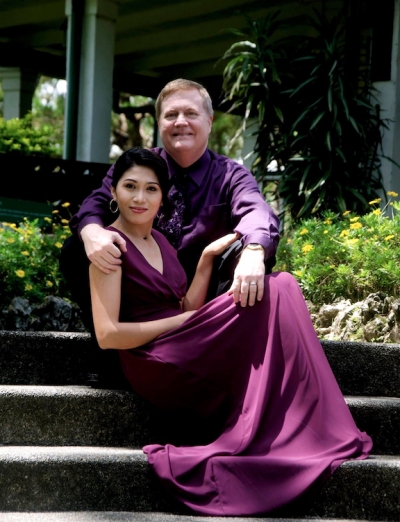
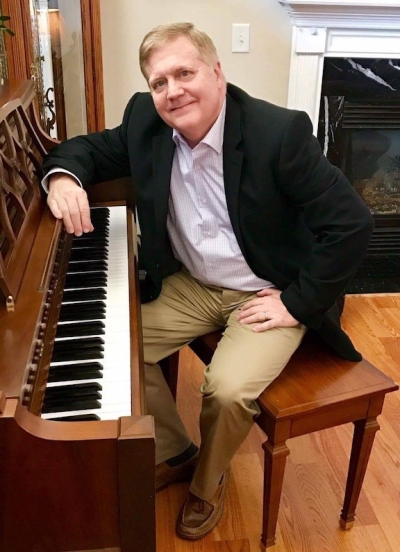
KP: That’s a really interesting approach! How long have you been a Whisperings Artist?
JMS: I’ve only been a Whisperings Artist since July 2020 and was so very honored to join this great group with David Nevue and all the other great pianists/composers there. There is so much to learn from these music masters of the piano and I’m enjoying now interacting with some of them and look forward to doing more so in the future, particularly when we get through this pandemic we are all facing.
KP: It’s a great group of artists!
Since you mentioned the pandemic, how has it affected your work?
JMS: As a composer, I’ve actually done very well during the pandemic and parts of my sales have greatly increased. Recently, my income from royalty sources rivals my work as a full time professor, so in some senses, I have two full time jobs going at once. We are back at the college teaching in person and it has been difficult in the music area as we are following all the suggested protocols. When I’m directing our College Choir with everyone wearing masks, it’s very difficult to hear, and all touring has, of course, come to a halt.
KP: It seems to be a very productive time for many of the artists that I know, while others are really having a tough time. Do you have any advice for musicians who are struggling right now?
JMS: There are some things you can’t control, but with the extra time you have now, you can do your best to do things that will put yourself in a strong position when the music returns. In Nashville and in the music publishing areas across the country, I have many full-time musician friends who are experiencing very difficult times. Since a lot of my music is piano, organ, and solo instrument combinations, I’ve been fortunate because there is still some demand for that. But publishers and writers depending on ensemble/choir type groups, musicians performing/touring, and those writing for network/cable/film shows that have had to shut down production… most of these musicians have really taken a beating. I pray that this pandemic ends soon and when it does, we all need to go out of our way to support the artistic community in any way we can and find ways to support it now.
KP: Well said! Let’s look back a bit on your earlier life. Where were you born and where did you grow up?
JMS: I was born in Fort Worth, TX and lived there for 3 years before moving to Alabama, which I consider home and where I also went to college at Samford University. Many times I refer to Atmore, the small town where I grew up, as LA (Lower Alabama). Although it wasn’t exactly an artistic center, there were always people that encouraged my music and music activities to be involved with at church and school.
BTW, my master in music is from The Southern Baptist Theological Seminary in Louisville, KY and I received a doctorate in composition from the University of Kentucky.
KP: Is any of your family musical?
JMS: My dad is very musical and still has a golden tenor voice. He has always loved tinkering with and playing many instruments. I know I got my love of music from him.
KP: When did you start playing the piano?
JMS: I’m thinking I started taking piano around the 2nd grade. When we moved to Atmore, AL when I was in the fifth grade, my mom worked it out for me to get out of PE one day of the week and walk down a block to take piano. I hated it…(I wanted to be on the playground with all my macho buddies and NOT playing piano). At the end of the year the piano teacher called my mom and said she wasn’t teaching me anymore. My mom was so embarrassed and I thought she was going kill me (but inside I was rejoicing!). A couple years later, I started teaching myself to play by remembering the notes on the lines and spaces and playing out of the 2nd grade, red John Thompson book. I fell in love with music and practiced hours a day. After going through a number of teachers as I was progressing, I eventually took lessons again from the lady who “kicked me out.” She was a great teacher and we had a great relationship. Let me say too that although I may have embarrassed my mom, she always supported me in everything I did (including taking me to many piano lessons) and for that I’m very grateful.
KP: How long did you take piano lessons?
JMS: Once I started taking again, I probably took lessons from the 7th grade though college and graduate school, but I didn’t take piano in my doctoral studies as there I focused on composition and orchestration.
KP: Were you encouraged to compose or improvise by your teachers?
JMS: Yes, I was encouraged some by early teachers, but really developed it on my own mostly. Improvisation and playing by ear didn’t come naturally to me, yet I was always very fascinated by those who had those skills. I actually taught myself through the study of music theory and applied that to improvisation and composition. I love to improvise! And composition is really selected improvisation. If you want to be a great composer, learning improvisation is crucial. At first, if the note wasn’t written on the page, I couldn’t play it. So my learning improvisation was somewhat a backward approach from most people. However, I believe this makes me able to teach improvisation to other pianists who were perhaps classically trained with teachers who discouraged improv, usually because the teachers themselves were not comfortable teaching it as many times we all stick with our strengths. Yet it is my opinion that professional musicians need to learn it all from reading music, reading chord charts, playing by ear, and improvisation.
KP: I agree. My teacher really discouraged improvisation, so I’ve always felt kind of cheated there. When did you write or compose your first song?
JMS: I started to write some simple piano songs and melodies while I was in junior high school. My first published song was named “Falling Star” and was with Shawnee Press back in 1981. After that, I had the “bug” to continue publishing as a composer. I was writing all the time and was determined to get another song published. I sent out hundreds of half-baked songs and got just as many rejection letters (if I was lucky to get one). However… it took 8 years before I got my second song published. There’s a lot to be said about persistence and paying the price to achieve your dreams.
KP: Absolutely! When did you start playing professionally?
JMS: I started playing piano and organ in church for pay when I was in high school and played in various professional settings over the years; I’ve been in a number or church music positions as well.
KP: Who were some of your favorite musicians when you were growing up?
JMS: Some of my favorites growing up included Barry Manilow, Jim Croce, Chuck Mangione, Spirogyra, Nat King Cole, Earl Klugh, Frank Sinatra, Andre Crouch, and many others. BTW, in the piano area that I write in now, my favorite is Kevin Kern… I love his music and it always takes me to a place I long to be.
KP: I’ve known Kevin for a lot of years. He’s a great guy and an amazing pianist! He’s done several house concerts both here in Oregon and back in the SF Bay Area (when we both still lived there). The first one was a workshop with some of my piano students and that was the first time Kevin had heard someone else playing his music. It was an amazing experience to share that moment with him!
Which instruments do you play besides piano and keyboards?
JMS: Besides piano, I play guitar, organ, and in the distant past played some trombone, violin, viola, and saxophone. However, piano is my main thing!
KP: Who and what are some of the influences on your music?
JMS: Some of the previously mentioned musicians. Classically, I love Rachmaninoff (my favorite composer) along with Ravel, Puccini, Sibelius, Tchaikovsky, Bach, and many others.
KP: What has been your most exciting musical experience to date?
JMS: Probably having written a song with Joseph Martin entitled, “Without Love… We Have Nothing,” (내가 천사의 말 한다 해도) which has become one of the most well-known Asian wedding songs around the world and gained me a couple all-expense paid trips to Korea where I taught master classes on writing and improvisation and was the featured clinician at some large church music workshops with Sunmin Music because of the song’s success.
KP: Wow! Is there anything else you’d like to “talk” about?
JMS: I’m very happily married to my wife, Babra, where we reside in Nashville with Jewel Grace, my step daughter. Babra is a full-time employee at Amazon and I’m always proud of her, as she is consistently one of their top employees. My daughter, Heather, lives in Quantico, VA where her husband is a Marine and where my one year-old grandson, Jackson, lives and who looks just like me! Also, besides working at Welch College, I play piano every week at a Baptist church near our home.
Many thanks to James Michael Stevens for taking the time to chat! For more information about James and his music, be sure to visit
his website and his
Artist Page here on MainlyPiano.com.
Kathy Parsons
October 2020

